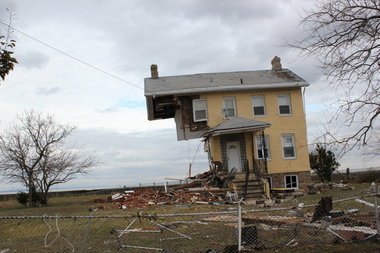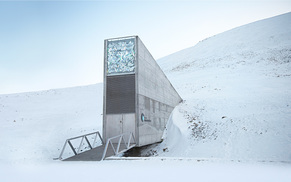weekly column
|
Each week, find a commentary on something connected to verses of Torah or another source of wisdom
|
|
Each week, find a commentary on something connected to verses of Torah or another source of wisdom
|
 The Genesis:3 Project The descendants of Gomer: Ashkenaz, Rifat and Togarmah. Genesis 10:3 What name do you give to a newborn? No decision is of more consequence before the fact and less consequence after the fact. The choice of a name bestows a legacy. For European Jews, who customarily gives names that honor the memory of a “beloved departed,” the baby is meant to keep their remembrance alive. For Mediterranean Jews, who customarily honor the living, the baby is meant to carry forward the namesake’s best qualities. Others choose historical figures (Thurgood, Jackie), aspirations (Faith, Hope), names they just like (Max!) and, of course, Biblical names…but not all of them. Here is what most parents discover after the long conversations and delicate deliberations about the baby’s name: no matter what the intention behind bestowing a particular name, it won’t be more than a few days before the baby begins to make that name her or his own. That’s true even in the book of Genesis, where no one can be accused of borrowing a name from an ancestor. Noah, whose name means “rest,” barely had a moment of it. Isaac, meaning “laugh,” didn’t seem to have much to laugh about. Dinah, from the word for “law,” never saw much justice. But sometimes a name carries with it a certain legacy that any subsequent person will have to work hard to overcome. A story arc in the 1980’s series “Hill Street Blues” followed the short-lived career of a comedian named Vic Hitler. He was very defensive about his last name – his father, he said, put up with a lot of abuse to maintain it. His manager suggested he could overcome the aversion most people felt by honoring his father and changing his name to Vic Hitler, Jr. Real-life comedian Albert Brooks changed his last name for professional reasons. His father was also a performer, having created a character called Parkyakarkas. But his real name was Harry Einstein. The expectations of a guy named Albert Einstein doing stand-up were likely both higher and lower than he probably preferred. And then consider Jim Nabors. Now in his 80s, Nabors rocketed to fame playing a dimwitted gas station attendant on “The Andy Griffith Show.” He went on to star in his own series based on the same character who was named Gomer Pyle. If you read the verse from Genesis at the top of this column, you will notice that one of those original Genesis names is Gomer. As Gomer Pyle might say, “Gaaawww-lee.” Until last week (literally), I never heard of another real person named Gomer, but it is no less likely than Dinah, Isaac or Noah. Yet I can’t imagine anyone choosing the name Gomer for an American child today. Though Jim Nabors had a long career as a comic actor, talented baritone and macadamia nut farmer (honest), the role he defined has probably ruined the name for as long as YouTube and Hulu exist. Somewhere, sometime someone will reclaim the name. It has happened before. The Torah is not too kind to Ishmael and later Jewish legend makes things even worse. But many hundreds of years before Herman Melville used his name for the narrator of Moby Dick, a High Priest in the Second Temple was named Ishmael, and his namesake grandson defined the principles by which the Bible is interpreted. It is included in the introductory section of daily worship. So to all of you who will have grandchildren and great-grandchildren named Gertrude and Elmer and Tzophenatpane’ah, remember to relinquish your expectations. They will make those names their own. ----------------------------------------------------------------------------------------------------------------------------- In last week’s column, I made light of my flirtation with vegetarianism and veganism. At least one reader – a committed vegan – found my words insulting, not at all the spirit I had hoped to convey. If I say the exchange between us was unpleasant, I would be telling the truth. But if I let the nature of the communication obscure the point, I would be overlooking the truth. So if you are someone whose culinary ethic eschews meat or anything part of animal life, my apologies for creating the impression that it is cause for sport. I may not embrace your decision, but I respect it.
0 Comments
 The Genesis:3 Project Every moving thing that lives shall be for you to eat, just as I gave you all the green herbs. Genesis 9:3 I like meat. I keep a kosher diet, meaning I eat less meat than opportunity presents, but give me a choice between haute cuisine consisting of the aforementioned green herbs and a simple pastrami sandwich and, nine times out of ten, my only question will be “what kind of mustard do you have?” But there is no question that humanity was meant to be vegetarian according to the Bible. The permission to eat every moving thing that lives (later restricted for the Jews) appears after bloodlust seems pretty well established from Cain forward. Meat is expensive to produce and it damages the environment. We have to divert land from producing food for people to growing huge quantities of feed for animals. The animals themselves create effluence – solid, liquid and gas – that challenges the purity of land, water and air. The parts of the animal we can’t or won’t eat do not nourish the earth when we dispose of them. The places meat is “harvested” are fit for very little else and, therefore, sit abandoned or neglected when their technology is obsolete or the market tanks. And getting meat from where it is raised and slaughtered to where it is sold and eaten requires conveyances and fuel consumption and all sorts of things that make “locally sourced” irrelevant for most people. My stomach overrules my conscience in these matters. I am not open to vegetarianism, and my admiration for vegans is matched by my pity for them whenever I have a pizza or a bowl of ice cream. Yet, there is one argument I cannot answer to my own satisfaction. I deal with it through distance, denial and distraction. Eating meat means taking life. And yes, I know the words to "Dona Dona" (and the Talmudic antecedent, Bava Metzia 85a). And yes, I know that technically speaking sentience is a relative quality among fauna and flora. But in order for me to enjoy a burger or a bowl of chicken soup or a brisket, something has to die. Violently. Like most modern consumers in this generation, I am protected from the practice of slaughter by euphemism and plastic wrap. The rabbi who served my congregation in the 1930s and 1940s also schechted (slaughtered kosher) chickens in his back yard. The father of a dear friend was a kosher butcher and when he accidently cut off a piece of his thumb, he wrapped it in butcher paper and went to hospital to have it reattached. And one of my kids, taken by the Jewish day school to a kosher slaughterhouse at a tender age, returned home a vegetarian. (The school has since suspended the visits and my child has suspended the vegetarianism.) But me? I buy my protein with an expiration date stamped on the paper label attached to the wrap. Here's what I cannot ignore, however. In order for me to slap a steak on the grill, a lot of people have to do the jobs from which I want to avert my eyes. Some of them are highly skilled and some of them are exquisitely educated about animals and health standards and environmental impact. But most of them are people willing to take the jobs the rest of us won't consider because they have to. Especially here in the United States, they accept these dirty and distressing tasks in order to keep a roof over the heads of their families or to earn enough money to send back to those families in another place. Their pay is modest. Their recourse for mistreatment is limited. The dangers they face are disabling. Please don't read this as a wholesale indictment of meat producers. I am not suggesting that we need to resurrect Upton Sinclair to update The Jungle. But especially if I am going to insist on a habit that compromises some life for my indulgence, then I can't allow myself to distance, deny and distract. Workers deserve not only a fair wage, but a decent life. That is, I hope, a logical statement, but just in case it isn't, I add that it also reflects Jewish values. And adding the layer of my kosher commitments to my consumption of barbecued beef means I can't segment my attempts at Jewish integrity. I'm ready to pay more for kosher meat, but also to insist that the workers, mostly non-Jews, who prepare it and transport it to market share fairly in that increased cost. Eating meat means taking life from animals, but it should not mean taking life from other people. And finally, a commercial of sorts, though I have no stake, financial or otherwise, in the product. My friend Seth Goldman, whose "Honest Tea" you might drink, is one of many people creating an intriguing alternative to the environmental challenges of my culinary preferences. "Beyond Meat" is manufacturing plant-based protein that mimics meat in taste and texture, but not in waste and calories. It may be many years before I can buy a hunk of plant-based protein to stick in my crockpot, but I am glad to know that sooner or later I will not be slicing into the brisket that destroyed the world.  The Genesis:3 Project …the waters then receded steadily from the earth. At the end of one hundred and fifty days the waters diminished Genesis 8:3 There is no such thing as an inconsequential flood. It doesn’t matter whether we are talking about New Orleans after Hurricane Katrina or that time the water hose to your washing machine burst while you were on vacation. The waters steadily recede, and after some time they diminish. But the aftermath is a mess. The first couple of years that we were married, my wife and I lived in the San Fernando Valley section of Los Angeles. One winter there was an overabundance of rain and my cousins who lived in a house perched mid-way down a mountain found themselves in the path of the run-off. Not only did the water invade their home, but it caused a “pop-out,” which is a baby mud slide. (I think it is called a pop-out because it reassures people that they are not about to reenact the last days of Pompeii.) It wasn’t two days before the sun was out again, but it was a week before the house dried out and it took a crew of workers days of shoveling to remove the heavy mud that covered half of the roadway between the front door and the hillside. A flood is not like filling the sink with water and then opening the drain to let it out. There are other kinds of disasters that result from a sudden imbalance of nature. They, too, create consequences that long outlast the event itself. But I have a particular interest in floods for two reasons. First, the verse above comes from the story of Noah’s ark. And second, one of my kids has devoted her education and career to helping people who have been effected by floods. It is sacred work because it saves lives and it saves the quality of lives. At various times she has been dispatched to New Orleans after Katrina, to Cedar Rapids after the river escaped its banks, to New York after Sandy and even to smaller communities dealing with persistent water problems that need an engineered amelioration. She has done this work on behalf of the United States Congress, a government contractor, a major university and, these days, the Federal Emergency Management Agency. In other words, mostly the federal government and its supporters. Reading the story of Noah (and likely other flood epics), it is easy to come away with a sense that the waters rise and then they fall and shortly thereafter everything returns to normal. We can be lured into believing that the highlights reel that makes up the narrative tells the whole story. The ark settles on Mt. Ararat, the dove brings the olive branch, everyone exits the ark and Noah plants a vineyard – on to the rest of the story. But, in reality, people need a lot of help after a flood. They need to get rid of absorbent material (furniture, rugs, clothing) before it molds. They need to know if the wooden doors, drywall and flooring in their home will continue to provide a safe environment. They need to determine if the ground beneath home and business will support the weight of the structure. They need to get food, clean water and power safely and accessibly. They need to access medical care – both usual and emergent. The finest hour of public service is when it is helping the vulnerable who rely on government in times of need. And in order for the government to shine in those times of need, it must be prepared before the needs present themselves. I could make the same argument for police, fire, National Guard and park rangers. And EMTs, and public health officials. And building inspectors, product safety inspectors, public works inspectors. And educators, social workers, rec center staffers. And you can continue the list. All of these people are expendable until they are not, and then they are indispensable. These services are paid for with tax dollars. While the keepers of the public trust have a special responsibility to steward those funds well, it is not the case that the goal of good government is to allow people to keep as much of their money as possible. Bottom-line politics appeal to people who have never had a flood – or who don’t remember its aftermath. A country is more than an economy, and its government is one that invests in the resources to protect its citizens and advance its values…before the flood.  The Genesis:3 Project Also of the birds of the sky, seven by seven, male and female, to keep seed alive on the face of the earth. (Genesis 7:3) “Deep inside a mountain on a remote island in the Svalbard archipelago, halfway between mainland Norway and the North Pole, lies the Global Seed Vault.” So begins the web site dedicated to the Svalbard Global Seed Vault. Sunk into the rock and permafrost at a constant temperature of just below zero (F) is where the world stores the largest collection of crop seeds. There are other seed vaults around the world, but the cold and low humidity in Svalbard are a hedge against the natural and human-created disasters that could wipe out the world’s ability to feed itself. It is a Noah’s Ark for plants, built without divine instruction in anticipation less of floods than drought, disease, pollution or any of the other ways we can figure out to poison our food supply. Everything from wheat and corn to eggplant and potatoes to cowpea and sorghum is stored, in batches of about 500 seeds, in lockboxes owned by the nations and organizations that have deposited them there. It is a necessary precaution because once a plant goes extinct, there is no coming back. Absent the errant seed captured in fur or feces, when a crop is gone, it is gone. Losing various species of animals is a tragic upending of the ecosystem with long-term consequences. But if a source of food disappears, lots of people die in pretty short order. I admire combination of compassion and gloom that provoked Norway to establish this vault. It is one of the many initiatives provoked by our changing climate that reflects the paradoxical relationship that human beings have with life: we cherish it and squander it, often simultaneously. But the seed vault is not the only place that the essential components of survival are stored. On SD cards, thumb drives, hard drives, CD-ROMs, floppy disks and in the cloud, the stuff of our lives is preserved, allegedly forever. In many ways, a visitor in the distant future landing on a mostly dormant Earth could reconstruct humanity’s ups and downs from the digital detritus we left behind. Remember Rod Taylor discovering the talking rings in “The Time Machine?” Or your high school yearbook. Or those cartons of slides in the attic. Or the shoeboxes filled with snapshots from when Polaroid was the quick way to see a photograph. The flourishing of our fading memories can be renewed by the seeds that were preserved. The story of Noah’s ark in the Bible is an archetype. We have made a mess of things and it needs to be cleaned up. But the redemptive and restorative seeds of renewal are preserved – two by two, seven by seven, 500 by 500. This theme of preserving a remnant has lots of expression in the many thousands of years between the story of the ark and the founding of Svalbard. Not only Jewish tradition promotes the notion of a "righteous remnant" from which nation or even all of humanity is saved and then flourishes. Every religious revival, every rebuilt neighborhood, every rescued company can trace its success to the keepers of the vision, the seed of renewal. Also, by the way, every military coup, every putsch and every call to the caliphate. The notion that great oaks from little acorns grow can inspire forests...or kudzu. A wise friend of mine told me about the importance of being able to hold two contradictory ideas in mind at the same time. The context is completely different than this example, but the lesson is the same. The earth must be destroyed, but preserved. Humanity may destroy its food supply, but preserve it. Our life will be forgotten, but memory will be preserved. I look around this crazy world with its intractable conflicts, its three-steps-forward-two-steps-back cultures, it technological breakthroughs that are both blessing and curse and I understand Noah and the Global Seed Vault both. It is no revelation to affirm that life is born to die. And it is no surprise that life insists on begetting life, even knowing the ultimate futility. But in spite of all the ways we have figured out to obliterate a good thing, we have also capitulated to the primal urge to preserve it. Keep seed alive. |
Archives
October 2023
Categories |